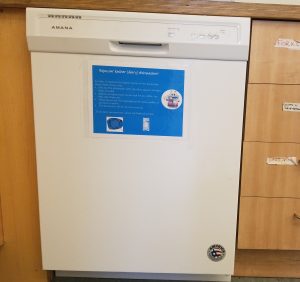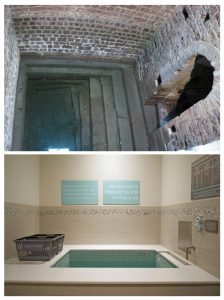
Rabbi Grossman, Head of School

New Akiva Dishwasher
Tu B’shevat is a time when modern Jews consider their responsibility towards the environment and God’s world, as I pointed out in my last column. Inspired by a number of Akiva students who have taken it upon themselves to spearhead grassroots environmental efforts at our school, our administration looked into what we could do as a staff to reduce waste and our carbon footprint. We discovered that our faculty uses over 16,000 paper cups every year. No, this is not a typo. Schools famously run on coffee, and as a staff of over 70 people, we drink close to 100 cups of it a day, or over 16,000 cups over a 180-day school year. For our Tu B’shevat effort this year, we decided to decimate our paper cup usage: over February break we installed a dishwasher in our faculty lounge and purchased glass mugs. By next week, we plan to move to reusable cups and glasses and nearly eliminate our use of disposable cups, lids, and sleeves. First, however, there is another step we need to take.

A medieval and a modern mikvah for the immersion of utensils
According to halacha, Jewish law, before we can use glass (or metal) eating utensils, we must purify them by immersing them in ritually pure water. This is called the mitzvah of Tevilat Keilim—the Immersion of Vessels, and there are several ways to do it. We can take the dishes to a natural ocean or a lake and immerse them in their waters, but this is difficult for those who live in cities. To address this challenge, the Jewish community builds indoor pools with ritually pure waters called mikvaot (mikveh or mikvah in the singular). These specially constructed baths imitate natural reservoirs by collecting rainwater from their roofs and transmitting it into basins. There are over five such mikvaot in Montreal, mostly concentrated in the Côte-Saint-Luc and Outremont areas, but there is no mikveh close to the Akiva school. There is a third option, however, which suits us well: it is permissible to purify dishes by immersing them in the snow.
A large pile of snow constitutes a natural mikveh by gathering water together. Of course, because the water is in solid form, it does not need to be contained by any walls. A mikveh must contain a minimum of approximately 600 liters of waters, which is present in any large accumulation of snow. And because snow is fluffy, it is easy to dip objects into it and have the items be completely surrounded by water—just in flake form! And so, to render our new glasses and mugs acceptable by halacha, we took advantage of the recent snowfall and invited our grade 5 and 6 students to participate in the mitzvah of Tevilat Keilim.

Akiva grade 5 students help tovel our new Akiva glasses
This week I had the opportunity to teach our grade 5 and 6 students about the laws of Tevilat Keilim, and we are taking advantage of the recent snowfall to tovel (immerse) our new environmentally sound cups. Having our students participate in this hands-on learning experience gives them the opportunity to be part of the double mitzvah of Tevilat Keilim and being better custodians of God’s earth.



